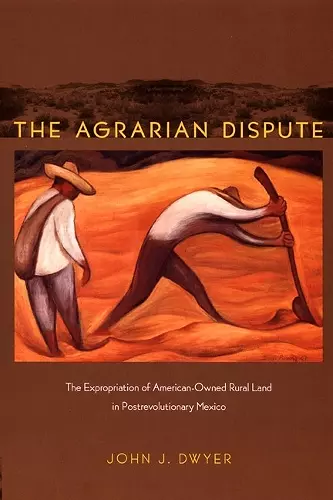The Agrarian Dispute
The Expropriation of American-Owned Rural Land in Postrevolutionary Mexico
Format:Paperback
Publisher:Duke University Press
Published:12th Sep '08
Currently unavailable, and unfortunately no date known when it will be back

U.S.-Mexican relations in mid-century postrevolutionary Mexico
In the mid-1930s the Mexican government expropriated millions of acres of land from hundreds of US property owners as part of President Cardenas' land redistribution program. This title analyzes this conflict at the local, regional, national, and international levels in a nuanced way that combines social, economic, political, and cultural history.In the mid-1930s the Mexican government expropriated millions of acres of land from hundreds of U.S. property owners as part of President Lázaro Cárdenas’s land redistribution program. Because no compensation was provided to the Americans a serious crisis, which John J. Dwyer terms “the agrarian dispute,” ensued between the two countries. Dwyer’s nuanced analysis of this conflict at the local, regional, national, and international levels combines social, economic, political, and cultural history. He argues that the agrarian dispute inaugurated a new and improved era in bilateral relations because Mexican officials were able to negotiate a favorable settlement, and the United States, constrained economically and politically by the Great Depression, reacted to the crisis with unaccustomed restraint. Dwyer challenges prevailing arguments that Mexico’s nationalization of the oil industry in 1938 was the first test of Franklin Roosevelt’s Good Neighbor policy by showing that the earlier conflict over land was the watershed event.
Dwyer weaves together elite and subaltern history and highlights the intricate relationship between domestic and international affairs. Through detailed studies of land redistribution in Baja California and Sonora, he demonstrates that peasant agency influenced the local application of Cárdenas’s agrarian reform program, his regional state-building projects, and his relations with the United States. Dwyer draws on a broad array of official, popular, and corporate sources to illuminate the motives of those who contributed to the agrarian dispute, including landless fieldworkers, indigenous groups, small landowners, multinational corporations, labor leaders, state-level officials, federal policymakers, and diplomats. Taking all of them into account, Dwyer explores the circumstances that spurred agrarista mobilization, the rationale behind Cárdenas’s rural policies, the Roosevelt administration’s reaction to the loss of American-owned land, and the diplomatic tactics employed by Mexican officials to resolve the international conflict.
“The Agrarian Dispute is a tour de force. John J. Dwyer ties international relations and domestic politics in Mexico together in an exciting new way, demonstrating that the expropriation of United States–owned land by the Cárdenas regime was of crucial importance for the relationship between the two countries, Mexico’s overall economic development, and agrarian reform. Few scholars cover both sides of the U.S.-Mexico border as well as Dwyer does.”—Ben Fallaw, author of Cárdenas Compromised: The Failure of Reform in Postrevolutionary Yucatán
“The Agrarian Dispute will force scholars to reconsider U.S.-Mexican relations during the Cárdenas years. John J. Dwyer shows how powerful domestic and international events were affected by the actions of ‘subalterns’ and how Mexico, a relatively weak power, deftly bested the United States with creative diplomatic tactics. He also makes a convincing case that the U.S. response to Mexico’s oil expropriation in 1938 was largely determined by the earlier controversy over the land confiscations.”—Timothy J. Henderson, author of The Worm in the Wheat: Rosalie Evans and Agrarian Struggle in the Puebla-Tlaxcala Valley of Mexico, 1906–1927
ISBN: 9780822343097
Dimensions: unknown
Weight: 585g
388 pages